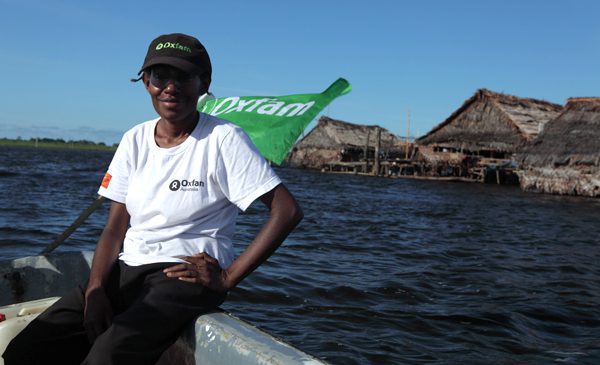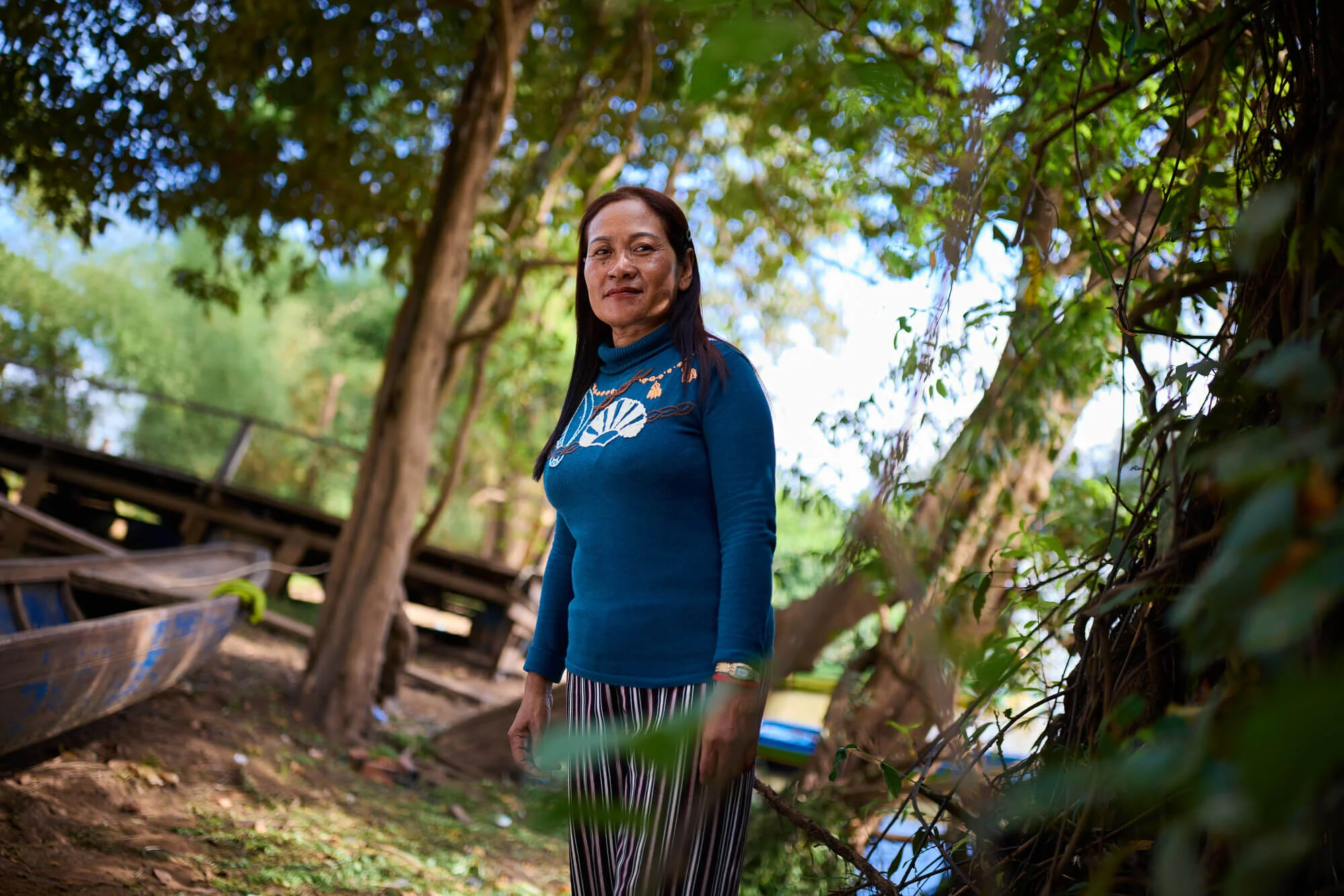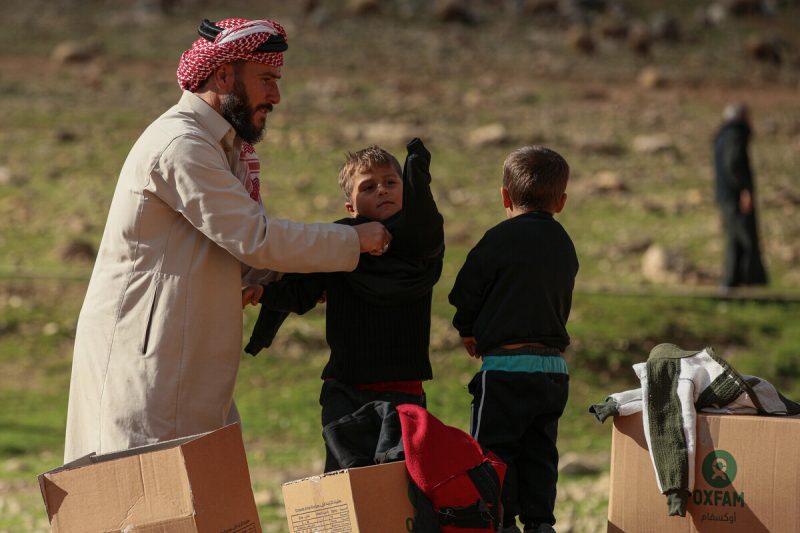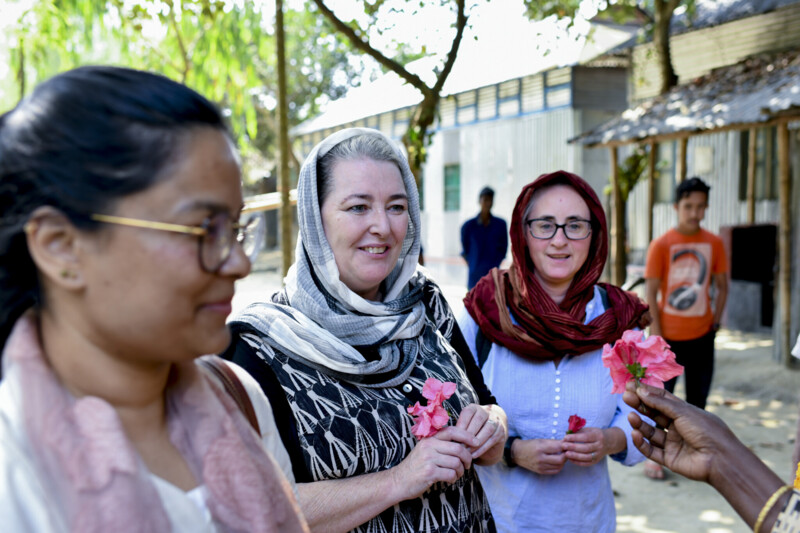Part 2 in our series of posts from a unique village in Papua New Guinea that’s built entirely on the Sepik River. The community there faces may health challenges, and Oxfam is helping to reduce the risk of disease.
First steps in Oxfam’s response
Krissy Nicholson, an Oxfam expert in humanitarian response, has spent the last seven weeks travelling each day to remote villages in the east Sepik region, responding to an outbreak of deadly cholera. Her passion for the people of Kambaramba 1 is inspiring. Today, she is showing me the steps Oxfam took in the response – first distributing vital hygiene kits.
“The Oxfam hygiene kits were distributed to approximately 2500 families, most in need in the region. The kits consisted of a bucket with a lid; two jerry cans for boiled water, ORS (oral rehydration salts) for treatment of cholera, packets of soap, and a cup. These seem like simple items but they’re essential for good hygiene and storage of water for the communities, and basic treatment for when people do get sick.”
Japat Autuma, 36, has six adopted children. In the past, because water is just outside her door she would bring it into the house each day without treating it.
“We used it for drinking and cooking. But when Oxfam came, they gave us jerry cans and buckets, soap, water catchments, and they told us how to use these hygiene kits. So we are using them as intended.
“Currently we bring the buckets out, we collect water, bring the water back to the house, boil the water, store it, and drink the boiled water. Yes, all of us are boiling water now, and our family plus the whole community, we are drinking boiled water, and that’s why there is no more cholera in the village.”
Oxfam distributed tarpaulins, nylon rope, and materials such as local bamboo and timber to create water catchments for families. This way, fresh water could be sourced periodically without relying totally on the river.
According to Krissy Nicholson, simplicity was key in the response.
“Simple solutions are really important, particularly in places such as the East Sepik where there are few resources, education is low, literacy is low as well. It is important that our messages are simple, that the hygiene kits go along with the messages.”
Making long-term impact
Education is a major focus in fighting cholera in the short-term, but has the longer-term benefit of reducing diarrhoeal diseases which plague young people here.
Oxfam trained local volunteers like Miriam Aimos, 20, who wanted to help.
“Oxfam came to assist us during the cholera outbreak, which has been really appreciated by all of us in the village,” Miriam says. “When you told us you would assist us, you helped us very quickly with emergency supplies.
“Through hygiene promotion Oxfam trained us as hygiene promotion volunteers. It has been very helpful and very good for us. We hope to continue working with you in the future.”
I watched Miriam run a health promotion workshop for around 100 people at Kambaramba 1. She demonstrated how to use the Oxfam bucket to collect water, use ash and soap for washing hands, and most importantly, promoted the “Five F’s”.
Fingers, fluids, faeces, flies & food
“The health staff and hygiene promotion volunteers went into the households and the families learned a lot, how to look after their own, and practicing the Five Fs – fluid, faeces, flies, food, fingers,” says Kambaramba resident Karimbi Wonguwa, 40.
“The family now washes their hands before eating; they are boiling the water; they are covering the food from flies; they are using the latrines; but it is hard to build latrines on land because there is no land.”
Being a village on water, there are no proper toilets. About 50 meters from Karimbi’s house are closet-like huts used as makeshift latrines, propped up by riverweed.
But there are more challenges, Karimbi says. To gather wood needed to boil water requires a six-hour round trip canoe ride to collect wood and bring it back to the community. People undertake the trip three times per week, an obvious challenge if they are to continue to boil water every day.
“If I come late from the lake and there’s no wood, it’s hard to have safe drinking water because they can’t boil the water,” Karimbi says.
Krissy is very hopeful, but also knows there is much more to be done.
“The next step for Oxfam is looking at longer term water and sanitation solutions,” she says. “We have a water and sanitation engineer here to do an assessment to inform our future planning. It’s really important that we don’t just stop at the emergency, because cholera is still here. It can still become a problem in the future.”
As our day ends, we circle a thatched house in the boat. People wave and warmly shout out “look-em you” (see you soon). I feel that the Oxfam team has become a part of the community.
Eva Waramapi is sitting with me on the bow of my boat. She smiles with heartfelt pride telling me that she does see more hope now. The educational nature of this emergency response is empowering people to help themselves.
“There is a big difference,” Eva says. “You can see it in the communities. Before, people knew nothing about cholera. Even though the health division was doing a lot of awareness, people still didn’t understand the whole thing. But since Oxfam came and we started going out, they really opened people’s minds. People are now well equipped with information on cholera.”



